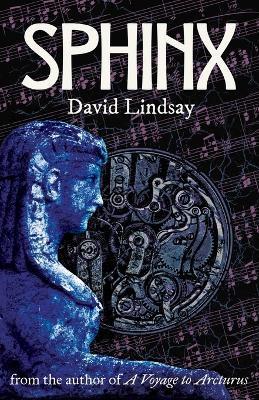Sphinx: from the author of A Voyage to Arcturus

Sphinx: from the author of A Voyage to Arcturus
Nicholas Cabot, 25 years old and newly endowed with his uncle's fortune, takes lodgings at the house of retired tragedian Leslie Sturt, intending to devote his time to perfecting an invention for recording dreams.
At the Sturt household, Nicholas hears "Sphinx", a short piece of piano music by local composer Lore Jensen. Nicholas sees the Sphinx as being the symbol of "The dreams we dream during deep sleep and remember nothing of afterwards...", while Evelyn, the middle of the three Sturt daughters, says that the Sphinx is asking, "'Why are you living in the world?' As none of us can answer it, we all have to die."
Soon after, Nicholas makes his first successful dream-recording, and finds it predicting a looming tragedy for the now creatively-bankrupt Lore Jensen. Meanwhile, he encounters a Sphinx of his own in the shape of Mrs Hantish, a young widow of whom Sturt says, "I do not think it is to malign her to place her in the fatal category..."
Originally published in 1923, this is the third novel from David Lindsay, author of what Colin Wilson has called "the greatest imaginative work of the twentieth century", C S Lewis has described as "that shattering, intolerable, and irresistible work", and Alan Moore has called "less a novel than it is private kabbalah", A Voyage to Arcturus. Like the "spirit-usher" Backhouse from that novel, Nicholas Cabot seeks to "dream with open eyes". Sphinx is perhaps David Lindsay's most autobiographical novel, dealing as it does with the difficulties of pursuing a creative vision in the socially constricted inter-war years of the early 20th Century. It is also, thanks to its depiction of a grand masque and fancy dress ball at a large country house, his most identifiable as being written in the Roaring Twenties.
PRP: 100.67 Lei
Acesta este Prețul Recomandat de Producător. Prețul de vânzare al produsului este afișat mai jos.
80.54Lei
80.54Lei
100.67 LeiLivrare in 2-4 saptamani
Descrierea produsului
Nicholas Cabot, 25 years old and newly endowed with his uncle's fortune, takes lodgings at the house of retired tragedian Leslie Sturt, intending to devote his time to perfecting an invention for recording dreams.
At the Sturt household, Nicholas hears "Sphinx", a short piece of piano music by local composer Lore Jensen. Nicholas sees the Sphinx as being the symbol of "The dreams we dream during deep sleep and remember nothing of afterwards...", while Evelyn, the middle of the three Sturt daughters, says that the Sphinx is asking, "'Why are you living in the world?' As none of us can answer it, we all have to die."
Soon after, Nicholas makes his first successful dream-recording, and finds it predicting a looming tragedy for the now creatively-bankrupt Lore Jensen. Meanwhile, he encounters a Sphinx of his own in the shape of Mrs Hantish, a young widow of whom Sturt says, "I do not think it is to malign her to place her in the fatal category..."
Originally published in 1923, this is the third novel from David Lindsay, author of what Colin Wilson has called "the greatest imaginative work of the twentieth century", C S Lewis has described as "that shattering, intolerable, and irresistible work", and Alan Moore has called "less a novel than it is private kabbalah", A Voyage to Arcturus. Like the "spirit-usher" Backhouse from that novel, Nicholas Cabot seeks to "dream with open eyes". Sphinx is perhaps David Lindsay's most autobiographical novel, dealing as it does with the difficulties of pursuing a creative vision in the socially constricted inter-war years of the early 20th Century. It is also, thanks to its depiction of a grand masque and fancy dress ball at a large country house, his most identifiable as being written in the Roaring Twenties.
Detaliile produsului









